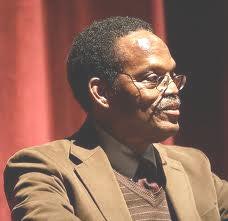 William Julius Wilson says the Moynihan Report drew backlash because of media accounts of its depiction of Black family fragmentation.
William Julius Wilson says the Moynihan Report drew backlash because of media accounts of its depiction of Black family fragmentation.WASHINGTON — Calling the 1965 Moynihan Report “prophetic,” Harvard sociologist William Julius Wilson on Thursday said that the controversial report’s call for “national action” has largely gone unheeded and that publicly funded interventions are needed to mitigate negative employment trends that hurt Black and Latino families.
“I suggest these kinds of broad-based initiatives with few illusions that they are politically feasible,” said Wilson, the Lewis P. and Linda L. Geyser University Professor at Harvard University, during a lecture at the National Press Club.
Despite the political obstacles, Wilson maintained that a “more inclusive, far-reaching initiative would elevate the skills and job opportunities” for those who need work.
“Poor and working-class Blacks and Latinos have been on the ropes since well before the Great Recession,” Wilson said, presenting unemployment figures that show a disparate impact on minorities. “Without coordinated, deliberate intervention at the policy level, the outlook for their economic future is very bleak indeed.”
Wilson—winner of the American Academy of Political and Social Science’s 2013 Moynihan Prize—gave his remarks while delivering the organization’s Inaugural Daniel Patrick Moynihan Lecture On Social Science And Public Policy.
Throughout the lecture, he invoked the legacy of the Moynihan Report, formally known as the “The Negro Family: The Case for National Action.” The report was authored by then-Assistant Secretary for Policy Planning and Research Daniel Patrick Moynihan before he became a U.S. senator.
Wilson said the Moynihan report—which he said was meant to call attention to the “interconnected and complex patterns linking unemployment and underemployment to family stability”—was prophetic but that it drew backlash because of media accounts of its depiction of Black family fragmentation.
Wilson offered a slew of education-based solutions to counter employment woes that he said have beset minorities in recent decades as technology, suburbanization and offshoring have reduced job opportunities in the central cities throughout the Midwest and Northeast.
“All this is unfolding as the so-called ‘college premium’—the financial and social benefits enjoyed by college graduates compared to those who are not—has increased considerably,” said Wilson, a winner of Diverse’s 2013 John Hope Franklin Award. “Graduates from selective universities and those with advanced degrees have done well in the labor market during the past 30 years.”
“Meanwhile, high school diploma holders and dropouts, in particular, have seen their marketability decline sharply during the same period across all racial groups,” he said. “These shifts are fueled in part by rising demand for better-educated workers at the expense of those with less.”
Wilson said more should be done to improve the educational experiences of students who live in low-income neighborhoods, particularly in light of the fact that Blacks and Latinos in low-income neighborhoods get educations that are “qualitatively different from those of their White peers.”
“Not only are they more likely to be educated in classrooms with mostly other poor minority students, but they are less likely to be placed in Advanced Placement classes and more likely to be suspended,” Wilson said.
“The dissimilarities do not end there,” he continued. “Blacks and Latinos from poor neighborhoods are also more likely to attend a community college than a four-year, degree-granting university. … And those who remain are more likely to populate remedial classes and less likely to graduate with a marketable degree.”
Wilson recommended a “comprehensive, far-reaching, inclusive, schools and jobs initiative” to fill the gap that hinders minority workers from acquiring or reconnecting with jobs.
“We now have a good deal of knowledge, much of it based on scientific evidence from randomized clinical trials or other sophisticated evaluation methods, about the kinds of educational and vocational interventions that could best succeed and under what conditions if brought to scale,” Wilson said.
Specifically, he cited:
n Partnerships between major employers, such as Caterpillar Inc. and community colleges, vocational schools and the U.S. Department of Labor to create apprenticeship programs that are in line with the employer’s needs.
n Career Academies, which operate in about 2,500 high schools throughout the nation, that combine academic instruction and training targeted to specific industries in partnership with local employers.
“However, to reach a broader range of workers such initiatives should be part of a more comprehensive employment policy,” Wilson said.
As an example, he suggested legislation that focuses on job-creation strategies—including the creation of public sector jobs—on areas with high unemployment.
He also suggested community colleges play a “more responsible role” in vocational preparation of adults in urban communities, as well as partner with quality child-care facilities to give single parents the opportunity to enroll their children in programs at unconventional times so they can attend class.
After the lecture, Diverse asked Wilson if government-funded initiatives were viable solutions given the fact that they often operate off limited funding and are similarly often not meant to exist in perpetuity, whereas entrepreneurship might be a better route since small business owners create jobs.
Wilson agreed that entrepreneurs create jobs but that those jobs would ultimately only reach a “small segment of the population.”
“So we need much more than entrepreneurs, but I should include entrepreneurs in a more comprehensive package of programs,” he said.





















